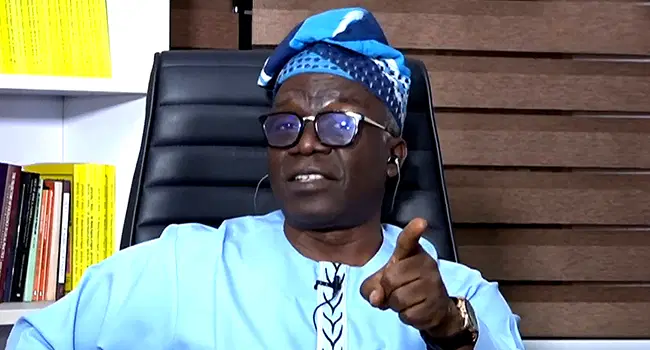Human rights lawyer and Senior Advocate of Nigeria, Femi Falana, has called on the government to cease mobilizing youths to disrupt rallies and to engage constructively with demonstrators expressing grievances over rising poverty and the high cost of living. Falana made these remarks during an interview on Channels Television’s “Politics Today” on Thursday evening.
Protesters across Nigeria, including in the Federal Capital Territory (FCT), have taken to the streets to demand improved economic conditions. Falana emphasized the importance of dialogue between government officials and protesters to address their concerns and foster a sense of belonging.
“We must also learn to stop mobilising people to disrupt rallies, we must stop mobilising traditional rulers and some emergency organisations to say, ‘we are pulling out of the protests,’” Falana stated. “The government must now begin to identify those who are genuinely aggrieved and then begin to engage them, ‘what are your complaints?’”
Falana also criticized the governments of Lagos and Ogun states, as well as the FCT Administration, for swiftly obtaining court orders to restrict protesters to designated areas. These orders confined protests to specific locations such as Freedom and Peace Parks in Lagos, the MKO National Stadium in the FCT, and various sites in Ogun State.
Falana explained that the protesters’ movement beyond the restricted areas might have been due to the fact that the court orders were obtained just 24 hours before the protests began, likely leaving insufficient time to properly inform the demonstrators.
“I think the government should have learnt not to rush to court on the eve of a strike action by workers, or the eve of a protest by young people because the difficulty with such orders is that they are never served on those they are made to restrain,” Falana said. “For instance, the order in Lagos was not served on anybody, the orders in Ogun State were not served on anybody, the order in Abuja, I think one of the defendants is said to be ‘unknown persons.’ Now, how do you serve court orders on unknown persons?”
Falana suggested that the government could designate protest venues, as is done in other countries, and noted that the authorities had over two weeks’ notice of the protests, which should have been sufficient time to inform protesters of any restrictions without resorting to court orders.
“In Lagos, largely today, from my information, people came from as far as about 30–40 km away to participate in the protest in Ojota. Again, that is the venue that was being used for protest, before the government sealed it off,” Falana added. “Ditto for Abuja, protesters were using an enclosure, the Unity Fountain; it is a stone’s throw from Transcorp Hilton Hotel. The government in Abuja, the FCT Administration, sealed it off. So, people then went to the street.”
Falana concluded that the government should avoid last-minute court actions and instead, utilize the notice period to inform protesters of designated areas for demonstrations.

